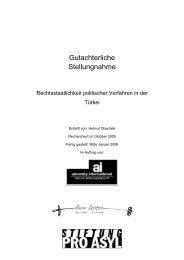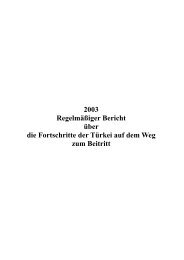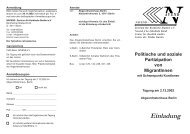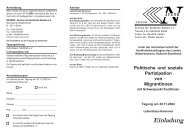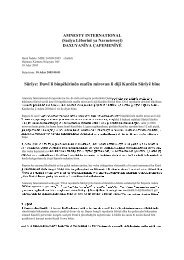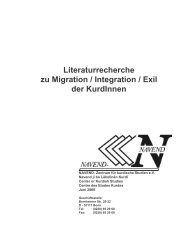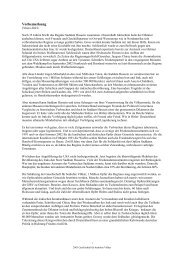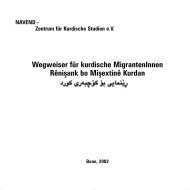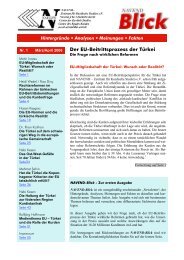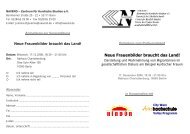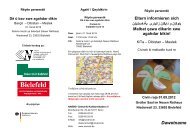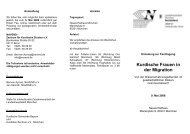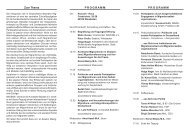Responsibility to protect the Kurds - Navend
Responsibility to protect the Kurds - Navend
Responsibility to protect the Kurds - Navend
Create successful ePaper yourself
Turn your PDF publications into a flip-book with our unique Google optimized e-Paper software.
<strong>Responsibility</strong> <strong>to</strong> <strong>protect</strong> <strong>the</strong> <strong>Kurds</strong><br />
March 2003<br />
able <strong>to</strong> achieve that objective, in a way<br />
that minimizes <strong>the</strong> loss of life.’ 1<br />
At <strong>the</strong> same time officials of <strong>the</strong> Bush<br />
administration have stated on <strong>the</strong> one<br />
hand that <strong>the</strong>y are preparing <strong>to</strong> provide<br />
humanitarian aid <strong>to</strong> <strong>the</strong> civilians in Iraq in<br />
<strong>the</strong> event of a war, 2 and on <strong>the</strong> o<strong>the</strong>r how<br />
<strong>the</strong>y plan for a post-Saddam Iraq. In a<br />
testimony before <strong>the</strong> Senate Foreign<br />
Relations Committee on 11 th February,<br />
Marc Grossman, Undersecretary for<br />
Public Affairs, outlined <strong>the</strong> guiding<br />
principles behind <strong>the</strong> official thinking of<br />
<strong>the</strong> Bush administration in defining its<br />
policy <strong>to</strong>wards Iraq, if a war becomes<br />
necessary. The principals are:<br />
First, we will demonstrate <strong>to</strong> <strong>the</strong> Iraqi<br />
people and <strong>the</strong> world that <strong>the</strong> United<br />
States wants <strong>to</strong> liberate, not occupy<br />
Iraq or control Iraqis or <strong>the</strong>ir<br />
economic resources.<br />
Second, we must eliminate Iraq's<br />
chemical and biological weapons, its<br />
nuclear program and its related<br />
delivery systems.<br />
Third, we must also eliminate Iraq's<br />
terrorist infrastructure.<br />
Fourth, safeguard <strong>the</strong> terri<strong>to</strong>rial unity<br />
of Iraq. The United States does not<br />
support Iraq's disintegration.<br />
Fifth, begin <strong>the</strong> process of economic<br />
and political reconstruction, working<br />
<strong>to</strong> put Iraq on a path <strong>to</strong> become a<br />
prosperous and free country. 3<br />
1 President George Bush Discusses Iraq in<br />
National Press Conference, 6th March 2003, at<br />
http://www.whitehouse.gov/news/releases/2003/0<br />
3/print/20030306-8.html. Emphasis added.<br />
2 ‘US, UN prepare <strong>to</strong> meet humanitarian needs in<br />
Iraq’, Washing<strong>to</strong>n File, 14 February 2003,<br />
available at htt://usinfo.state.gov<br />
3 Marc Grossman, Under Secretary for Political<br />
Affairs, Testimony before <strong>the</strong> Senate Foreign<br />
Relations Committee, 11 February, 2003, at<br />
http://www.state.gov/p/17616pf.htm<br />
3<br />
In <strong>the</strong>se and many o<strong>the</strong>r documents,<br />
press statements, interviews and<br />
congressional reports nothing is said<br />
about <strong>the</strong> particular issue of <strong>protect</strong>ing<br />
<strong>the</strong> Iraqi civilians before and during <strong>the</strong><br />
war from <strong>the</strong> possible Iraqi attacks. In<br />
particular <strong>the</strong>re does not seem <strong>to</strong> be any<br />
serious public consideration about <strong>the</strong><br />
risks <strong>the</strong> <strong>Kurds</strong> might face in <strong>the</strong> event of<br />
war, and that despite past experiences of<br />
Iraqi attacks against <strong>the</strong> <strong>Kurds</strong>.<br />
Paradoxically, though, past Iraqi attacks<br />
against <strong>the</strong> <strong>Kurds</strong> have been used during<br />
<strong>the</strong> past six months in <strong>the</strong> process of<br />
presenting Iraq as a real threat. Similar<br />
references <strong>to</strong> Iraqi use of chemical and<br />
biological weapons against <strong>the</strong> <strong>Kurds</strong><br />
functioned as an active element in <strong>the</strong><br />
need <strong>to</strong> drive out Iraq from Kuwait in 1990<br />
and 1991. The fact that Iraq has used<br />
weapons of mass destruction against <strong>the</strong><br />
<strong>Kurds</strong> reached an unprecedented level of<br />
clarity when <strong>the</strong> Colin Powell <strong>to</strong>ld <strong>the</strong><br />
members of <strong>the</strong> UN Security Council that<br />
<strong>the</strong>y should be deeply and continuously<br />
concern with one subject, that of ‘Saddam<br />
Hussein’s violation of human rights’.<br />
Powell argued that:<br />
Underlying all that I have said,<br />
underlying all <strong>the</strong> facts and <strong>the</strong><br />
patterns of behavior that I have<br />
identified as Saddam Hussein's<br />
contempt for <strong>the</strong> will of this council,<br />
his contempt for <strong>the</strong> truth and most<br />
damning of all, his utter contempt for<br />
human life. Saddam Hussein's use of<br />
mustard and nerve gas against <strong>the</strong><br />
<strong>Kurds</strong> in 1988 was one of <strong>the</strong> 20th<br />
century's most horrible atrocities;<br />
5,000 men, women and children<br />
died. 4<br />
4 Secretary of State Addresses <strong>the</strong> U.N. Security<br />
Council Secretary Powell Addresses The United<br />
Nations, 5 February 2003, at



